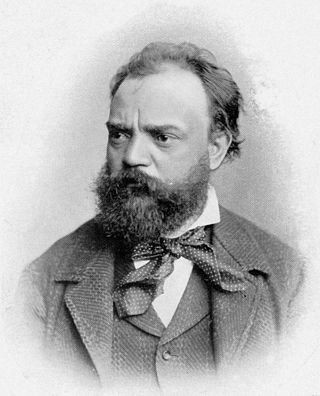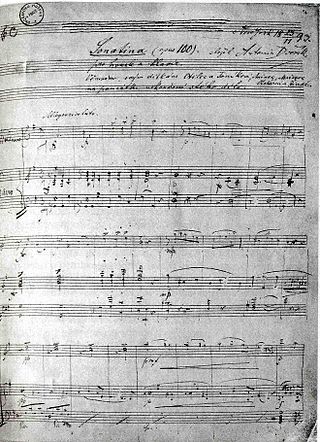Related Research Articles

Antonín Leopold Dvořák was a Czech composer. Dvořák frequently employed rhythms and other aspects of the folk music of Moravia and his native Bohemia, following the Romantic-era nationalist example of his predecessor Bedřich Smetana. Dvořák's style has been described as "the fullest recreation of a national idiom with that of the symphonic tradition, absorbing folk influences and finding effective ways of using them".

The String Quartet No. 12 in F major, Op. 96, nicknamed the American Quartet, is the 12th string quartet composed by Antonín Dvořák. It was written in 1893, during Dvořák's time in the United States. The quartet is one of the most popular in the chamber music repertoire.
Antonín Dvořák composed his String Quartet No. 11 in C major, Op. 61, B. 121, between late October and early November 1881 to fulfill a commission from the Hellmesberger Quartet.
Antonín Dvořák's Serenade for Strings in E major, Op. 22 (B. 52), is one of the composer's most popular orchestral works. It was composed in just two weeks in May 1875.
Antonín Dvořák's String Quintet No. 2 in G major, Op. 77 (B. 49), was originally composed in early March 1875 and first performed on March 18, 1876 in Prague at the concert of the Umělecká beseda.
Antonín Dvořák composed his String Quartet No. 13 in G major, Op. 106,, between November 11 and December 9, 1895. 1895 was an eventful year for him: he returned to Europe from America in April, and his sister-in-law died in May. Upon finishing No. 13, he took back up his No. 14 (Op. 105) in A-flat major, which he had begun before this quartet and finished it on December 30 of that year. The quartet in G major was given its first performance by the Bohemian Quartet in Prague, on October 9, 1896.

The Sonatina in G major for violin and piano, Op. 100, B. 183, was written by Antonín Dvořák between November 19 and December 3, 1893, in New York City. It was the last chamber composition he wrote during his sojourn in the United States. Dvořák catered the sonatina to the gradually developing musical abilities of his children, especially those of his 15-year-old daughter Otilie and 10-year-old son Toník, who played piano and violin respectively. In a letter to Fritz Simrock on January 2, 1894, Dvořák conceived the piece in the following terms: "It is intended for youths, but even grown-ups, adults, should be able to converse with it..." The sonatina was published by Simrock in Berlin in 1894. It also exists in a version for cello and piano.
The String Quintet in E♭ major, Op. 97, B. 180, was composed by Antonín Dvořák during the summer he spent in Spillville, Iowa in 1893. It is a "Viola Quintet" in that it is scored for string quartet with an extra viola. It was completed in just over a month, immediately after he wrote his American String Quartet. Like the Quartet, the Quintet finely captures the inflection of Dvořák's Bohemian idiom with American inspirations. The Quintet was premiered by the Kneisel Quartet in New York on 13 January 1894 along with the second performance of the Quartet and very favorably reviewed, as comparable to Mozart. The reviewer noted that the Quintet was "of the kind about which a commentator may write a small volume without exhausting his admiration or fully describing their beauties".

The Piano Trio No. 4 in E minor, Op. 90, B. 166, is a composition by Antonín Dvořák for piano, violin and cello. It is among the composer's best-known works.
The String Quartet No. 14 in A♭ major, Op. 105, B. 193, was the last string quartet completed by Antonín Dvořák, even though it was published before his String Quartet No. 13. Dvořák finished his Fourteenth Quartet in 1895, when he had returned to Bohemia after his visit to America. The gestation of the Quartet had actually begun in America and lasted six months, which was rather protracted for the composer. This Quartet marked an important point in Dvořák's development because he would devote himself almost exclusively to writing explicit program music, namely symphonic poems and operas, afterwards.
Antonín Dvořák's Piano Quintet No. 2 in A major Op. 81, B. 155, is a quintet for piano, 2 violins, viola, and cello. It was composed between August 18 and October 8, 1887, and was premiered in Prague on January 6, 1888. The quintet is acknowledged as one of the masterpieces in the form, along with those of Schumann, Brahms and Shostakovich.
Antonín Dvořák´s String Sextet in A major, Op. 48, (B. 80) for two violins, two violas and two cellos was composed for the most part in May 1878. It was Dvořák's first work to be premiered outside Bohemia.
Antonín Dvořák's String Quartet No. 8. in E major, Op. 80 (B. 57), is a chamber composition, written between 20 January and 4 February 1876 in Prague.
Antonín Dvořák finished the composition of his String Quartet No. 1 in A major, Op. 2, (B. 8), one of his earliest chamber works, in March 1862.
Antonín Dvořák finished the composition of his String Quartet No. 7 in A minor, Op. 16 (B. 45), on 24 September 1874, having probably started it on or around the 14 September.
Antonín Dvořák composed his String Quartet No. 6 in A minor, B. 40 Op. 12, in November and December 1873, finishing it on 5 December. He later revised it, but at this stage left the work unfinished. After a reconstruction by Jarmil Burghauser, with minimal additions, a first recording was made by the Prager Streichquartett, for Deutsche Grammophon, in March and April 1977.
Antonín Dvořák composed String Quartet No. 4 in E minor, B. 19 at some stage in the years 1869 and 1870. It was one of three which Dvořák later believed he had destroyed after he had disposed of the scores.
At over an hour's duration, Dvořák's String Quartet No. 3 in D major B. 18 is the longest of his compositions for this medium. It was written early in his career, probably at some stage in the years 1869 and 1870. In addition to its length, its style has been described in parts as Wagnerian.
The String Quartet No. 2 in B♭ major, B. 17, was probably composed by Antonín Dvořák in 1869, early in his compositional career. It was one of three which Dvořák later believed he had destroyed after he had disposed of the scores.
The Piano Quintet No. 1 in A major, Op. 5 (B. 28), is a piano quintet by Antonín Dvořák, scored for two violins, viola, cello and piano. Composed in 1872 in Prague, it was premiered in November that year. It was not published then and Dvořák lost the autograph over the years, having to ask a friend for a copy when he revised the work in 1887. The revised version was not performed until 1922, 18 years after his death.
References
- ↑ Honolka, Kurt (2004). Dvořák. Haus Publishing. p. 35. ISBN 9781904341529 – via Google Books.
- 1 2 3 "String Quintet No. 1". antonin-dvorak.cz. Retrieved 19 December 2020.